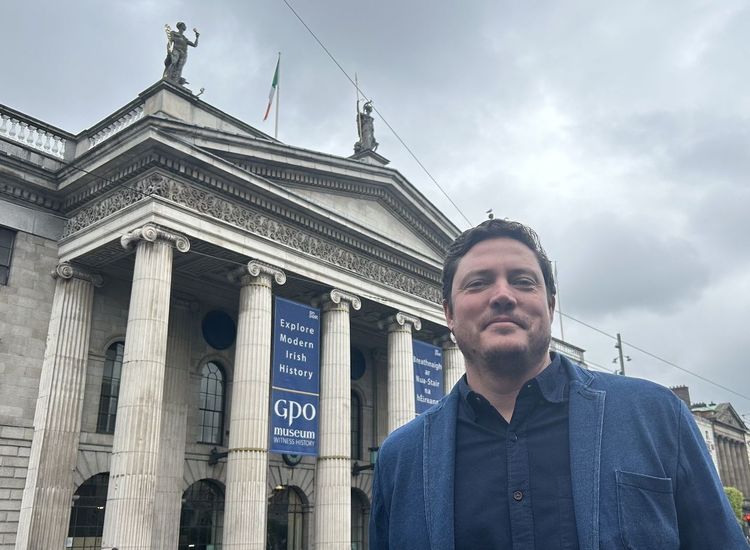Page Turner / Edited by Peter McDermott
“We met in Dublin in September 1969. I was looking for an apartment. A somewhat reluctant landlady showed me one of two apartments with a common stairway over a shoe shop,” begins poet Micheal O’Siadhail in the introduction to “One Crimson Thread.”
That led to his meeting a young woman from County Donegal who taught at an inner-city primary school. They married on July 2, 1970, and she died on June 17, 2013.
He told the Echo, that the volume “is a tribute to my beloved Bríd, my first wife, who for 20 years suffered from Parkinson’s disease. It has 150 love sonnets which tell of last two years of her life, her death and my grieving. It is a celebration of love that endured for 44 years.”
“As a child I lost my grandfather to Parkinson’s disease and I approached veteran Irish poet Micheal O’Siadhail’s ‘One Crimson Thread’ with some trepidation,” said Sheila Wild in Envoi.
“But the opening sonnet drew me in and I read the book in one sitting – something I rarely with poetry. I read closely. I read with tears in my eyes,” she added.
Wild said it was a “tough book,” and the poet writes “without sentimentality or schmaltz.
“And in writing this most touching love poem, O’Siadhail has also made a strong case for our prioritizing the quality of social care,” she said.
“O’Siadhail seems to rise to a new intensity of writing and analysis in this collection. This is both a searing and a beautiful interrogation,” wrote Martyn Halsall in Church Times, adding “it offers immense compassion and consolation.”
“It is a biography of a marriage and one of the most elegant pictures of faithfulness that I have ever encountered in all my years of reading,” Thomas McCarthy said in the Irish Examiner.
Micheal O’Siadhail
Date of birth: Jan. 12, 1947
Place of birth: Dublin, Ireland
Spouse: Christina Weltz
Children: None
Residence: New York
Published works: “One Crimson Thread” (Bloodaxe Books 2015, Baylor University Press 2017); “Collected Poems” (Bloodaxe Books 2013); “Say but the Word” (Hinds Publishers 2015) A new work, “The Five Quintets” is due from Baylor University Press in 2018. It is a Dantean mediation on modernity in conversation with prominent figures in the arts, economics, politics, science and philosophy/theology across 400 years.

Micheal O’Siadhail.
PHOTO BY MICHAEL SHEEHAN
What is your writing routine?
Are there ideal conditions? Clearly, poems don’t come on demand but I like to be there in case the muse calls and I’d miss her. I’m essentially a morning person. I wake firing on all cylinders and my best energy is before noon. Ideal conditions vary from person to person; I think of those French writers who love to work in cafés. I can think in city crowds but to write I like a table in a quiet room on my own.
What advice do you have for aspiring writers?
Rilke gave the ultimate advice in his “Letters to a Young Poet” – “Ask yourself in the most silent hour of your night: must I write? Dig into yourself for a deep answer. And if the answer rings out in assent, if you meet this solemn question with a strong simple “I must,” then build your life in accordance with this necessity; your whole life, even in its humblest and most indifferent hour, must become a sign and witness to this impulse.”
Name three books that are memorable in terms of your reading pleasure.
There are so many books that deeply impressed me that to choose three is impossible. I’ll chose three books which I read over the last year which I have found quite fascinating in different ways. Peter Quinn’s Poor Banished “Children of Eve” is an extraordinary literary achievement. Naomi Klein’s “No is not Enough” and “Making Sense of the Troubles: A History of the Northern Ireland Conflict” by David McKittrick and David McVea are two compelling examinations of complex political situations.
What book are you currently reading?
Alice McDermott’s new novel “The Ninth Hour.”
Is there a book you wish you had written?
The book I always wish I had written is the one that’s brewing within, the one I still must write. The greatest book of all is the next one.
Name a book that you were pleasantly surprised by.
It’s strange how you begin some books with no great expectations. I remember when I began reading “Gilead” by Marilynne Robinson, I wasn’t sure what I’d think. It turned out to be a book which amazed me.
If you could meet one author, living or dead, who would it be?
I’d love to meet William Shakespeare.
What book changed your life?
On my first visit to America in 1971, I read a small book by the sociologist Peter L. Berger called “A Rumor of Angels.” It changed my whole outlook on life.
What is your favorite spot in Ireland?
St Stephen’s Green in Dublin. I was born nearby on Earlsfort Terrace. I love to walk into the Green by the sculpture of the three Fates presented to Ireland after World War II by the German government. No matter where in the world I am, an instinct deep within turns:
“To follow the thread of a clue,
Back to my Fates at a corner of Stephen’s Green.”
You're Irish if…
the poetry of life moves you.










